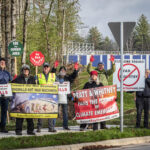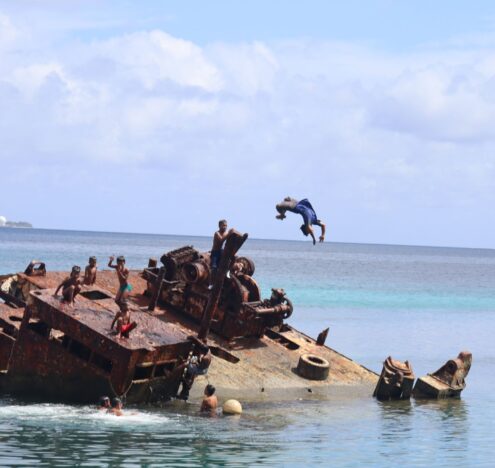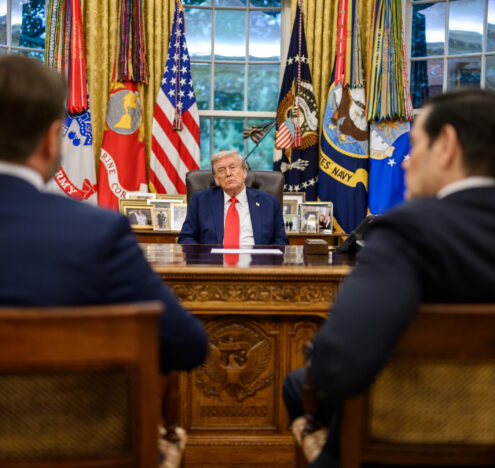Since 2017, when I departed the Beltway in favor of (literally) greener pastures, I’ve been trying to figure out how to create an institutional presence for alternative (ok, progressive) voices on foreign policy. Why? Although I don’t like the “Blob” epithet, there is a lot of consensus thinking in Washington — especially circa 2017 — and it’s historically really difficult to promote competing perspectives without your invitation to the cocktail party getting lost in the mail.
Worse than that though, I was appalled watching the “ideas industry” line up to support Trump’s foreign policy from the outset. The fashionable thing was to selectively criticize Trump — mostly in private — while being a public booster of specific administration policies. Too many think tankers were engaged in what Dan Nexon called “analytical normalization” of Trump. To some people, it might be obvious that the establishment would end up an appendage to power; it certainly was to a previous generation. But prior to 2017, I’d viewed the convergence between technocracy and political power as incidental, or at least mutually constitutive.
And I had better seats at the circus than most critics, having segued from foreign policy practitioner to traditional academic via the world of Washington think tanks. I’d collaborated with or directly worked for nearly every non-right-wing think tank in DC that does national security. To this day, even from afar, I spend more time than the average scholar kicking around the think tank scene. Some of that is because my research is animated by real policy problems. Some of it is personal networks and residual symbolic capital from a past life.
But the point is I was trying to get something going. I saw a need and thought I had the know-how to help fill it. I was active in the debates about progressive foreign policy that began percolating around that time. I had a number of conversations with like-minded people. There was momentum. But alas.
If you’re promoting an agenda that gels well with establishment liberal internationalism, maybe you don’t need a philanthro-capitalist’s backing because you’ll find it easier to secure government contracts and insider access that you can leverage for future grants. And if you have celebrity, maybe you can afford to confront the prevailing power structure. But I (and the folks I was brainstorming with) were not celebrities, and had no billionaire donors we could call on. Plus, progressive foreign policy ideas are mostly antagonistic to entrenched interest groups in Washington, Wall Street, and Silicon Valley. You need some combination of celebrity, power-friendly ideas, and wealthy patronage; we lacked all three.
The thing is, the value of a think tank isn’t in having office space on Massachusetts Avenue (though that helps); it’s the presence in elite conversations and social relations that matter.
But we weren’t the only ones responding to this energy out in the universe; there were many attempts by leftist and left-adjacent groups to launch think tanks in the Trump era. And despite the recurring claim that there is no leftist institutional presence in Washington, there has been for decades; they’re just treated like the skunk at the garden party by the mainstream think tanks. The thing is, the value of a think tank isn’t in having office space on Massachusetts Avenue (though that helps); it’s the presence in elite conversations and social relations that matter. And the left think tanks with a physical Washington presence ended up on the outside of elite conversations…which is why it’s become common to think that leftists had no presence in Washington.
Arguably the three most well-known (of many) anti-establishment think tanks are the Institute for Policy Studies, Progressive International, and the Quincy Institute for Responsible Statecraft. You might question their success measured in policy impact, but they’ve certainly succeeded in consistently opposing default liberal internationalism while remaining organizationally solvent. And in all three cases, they had the critical success factors I lacked.
The Institute for Policy Studies (IPS) was the original progressive think tank, and it still exists. It was founded in 1963 by aides in the Kennedy administration who rejected Marxism but also grew alienated from the anti-Soviet hysteria and arms racing of Cold War liberalism. Their ideas were not friendly to power, but because its founders came from the establishment, they had direct access both to senior officials in the Executive Branch and in Congress, for a while anyway. Crucially, their board of trustees counted several wealthy individuals as well as influencers like famed realist Hans Morgenthau and the publisher of Scientific American magazine. (full disclosure: I started my writing career as a contributor to Foreign Policy in Focus, a project of IPS).
When IPS expanded to an overseas campus called the Transnational Institute in the 1970s, moreover, the founding moment was much the same. A catalyzing event in Paris that brought philanthropist and eventual backer Samuel Rubin together with representatives of the anti-war activist movement and Parisian intellectuals, including Roland Barthes and Michel Foucalt. It’s all documented in a really good new book that covers the history of IPS.
Fast forward to 2018, when Progressive International, a hybrid think tank and activist network that aims to create global left solidarity among other things, was founded. Their ideas are extremely confrontational to the international order as it currently exists, but that’s been fine because 1) their theory of change isn’t based on playing an elite insider’s game, and 2) it was initially backed by Bernie Sanders and Yanis Varoufakis — two of the biggest names in progressive politics. Their strategy involves appeals to not just the Democratic Party’s base, but to leftists abroad too; they’re not fishing for meetings at the State Department or Liberty Crossing.
The following year, in 2019, Andrew Bacevich, Susanne DiMaggio, Stephen Wertheim, Trita Parsi, and Eli Clifton co-founded the Quincy Institute for Responsible Statecraft. Their focus is on the restraint portion of the progressive foreign policy agenda but not necessarily the other parts. They all had varying degrees of name recognition, and to the chagrin of establishment Washington, started with financial backing from the strange bedfellows George Soros (via the Open Society Institute) and Charles Koch. It’s still not clear to me how much they aim to play an insider’s game, but by most accounts, their influence is much greater on the outside, doing Overton window work.
Basically, to be viable espousing ideas that go against the grain, you need a plausible theory of change and a plausible financial model. Celebrity can help you with both, and enough money solves all problems (in the American system anyway). None of it necessarily means that you’ll succeed in changing policy or government or the international order — for that you’d need a viable strategy of influence that includes clarity about how you’ll play with different constituencies — the grassroots, corporations, media, and/or decision-makers. But for your influence strategy to matter, you need money, celebrity, or elite-friendly ideas.
So what’s the way forward? Even if you love all of these organizations, there’s still a gap. There’s room for a think tank that 1) develops and advocates for ambitious ideas big and small, 2) grounded in an analytical language that resonates with Washington technocrats, and 3) bridges “structural holes” dividing activist and elitist constituencies.
And that’s why you should join me in lobbying for The Judd Apatow Institute for Global Strategy. The John Cusack Center for International Security. The Chrissy Teigen and John Legend Progressive Policy Network. The Killer Mike Committee to Plot, Plan, Strategize, Organize, and Mobilize. I’m half-kidding. But only half. I have a hard time seeing how we’ll build a cadre of people to develop and fight for better foreign policy ideas without deep donor pockets or celebrity (ideally both).
Van Jackson is a professor of international relations at Victoria University of Wellington in New Zealand, and a think tanker at lots of places around the world: a distinguished fellow at the Asia Pacific Foundation of Canada; an adjunct senior fellow at the Center for a New American Security; a senior associate fellow at the Asia-Pacific Leadership Network for Nuclear Nonproliferation & Disarmament (APLN); and the defence & strategy fellow at the Centre for Strategic Studies in New Zealand. He also hosts The Un-Diplomatic Podcast.
This piece originally appeared in The Duck of Minerva.




















